Abstract
Institutions are made up of formal rules (constitutions, laws, and regulations) and informal
constraints (conventions and norms of behavior), and the way both are enforced. Wellspecified property rights that reward a productive and creative activity, a legal system that
enforces such laws at low cost, and internal codes of conduct that are complementary to such
formal rules are the essential underpinning to productive economy. In order to counteract the
illegal property redistribution, it is necessary to have a complex system of uniform norms and
interrelated standards of practice, such as legal framework, common policy in the field of law
enforcement and coherent policy of economic security. In the article the system of regulation
of property rights institutions in Ukraine has been analyzed and an effective option has
been suggested. They were based on the economic interest more than on administrative
enforcement.
References
Antoniuk, N. A. (2019). Theoretical and Methodological Approaches to Anti-Crisis Management of the National Economy in the Context of Decentralization: a monograph. Lutsk: Eastern European National University named after Lesia Ukrainka.
Arefieva, O. V., Vovk, O. M., Posypaiko, Ye. A. (2020). Intensification of material and technical support formation of an enterprise in the conditions of neoindustrial modernization. “Economics bulletin of the National Mining University” No. 2 (70). DOI: 10.33271/ev/70.123.
Development of agricultural entrepreneurship: trends and prospects (2012). Proceedings of the Fourth International Scientific and Practical Conference of Young Scientists. Kyiv: NSC „Institute of Agrarian Economics”.
Hanushchak-Efimenko L. M., Shcherbak V. G. (2016). Innovative entrepreneurship development based on cluster organization. “Actual problems of economics” No. 11(185).
Hodgson, G. M. (1989). Economics and Institutions: A Manifesto for a Modern Institutional Economics. Philadelphia: University of Pennsylvania Press.
Lisovyi A. V. (2018). Tax regulation of development of rural territories of Ukraine: a monograph. Melnyk Publishing House.
Lisovyi, А. V., Gerasymchuk N. А., Bodnarchuk O. H. (2018). Analysis of motivation for deregulation of entrepreneurial activity as the main way to reduce administrative barriers in the economy. “Scientific bulletin of Polissia” No. 1 (13), P. 1
Malik M. Y., Shpykulyak O. G. (2010). Institutionalization of agrarian entrepreneurship: transformation and efficiency. „Economy of agro-industrial complex” No. 7.
Meyers, W. H., Demyanenko, S. I., Johnson, T. G., Zorya, S. I. (2005). Refocusing Agricultural and Rural Development Policies in Ukraine: Action Plan for the Road Ahead. Washington DC: USAID.
Nitsenko, V. (2020). Mismanagement in Ukraine. “Problems of Management in the 21st Century” No. 15(1). DOI: 10.33225/pmc/20.15.04.
North D. C. (1990). Institutions, Institutional Change and Economic Performance. Cambridge: Cambridge University Press.
Olson, M. (2000). Power and Prosperity: Outgrowing Communist and Capitalist Dictatorship. New York: Basic Books.
Shpikuliak, O. H. (2008). Institutional peculiarities of entrepreneurship and social capital development in agrarian sphere. „Agrosvit” No. 11.
Sonin, K. (2005). Institutional theory of infinite redistribution. „Questions of economics”, No. 7.
State Statistical Service of Ukraine. Access on the internet: http://www.ukrstat.gov.ua
Stepanenko, S. V. (2008). Institutional analysis of economic systems (problems of methodology). Kyiv: KNEU.
The handbook of research on entrepreneurship in agriculture and rural development (2011). Edited by Gry Agnete Alsos, Sara Carter, Elisabet Ljunggren and Friederike Welter. Edward Elgar Publishing Limited.
Titenko, Z. M. (2017). System of electronic administration of value added tax for agricultural producers. “Economic Bulletin of the Zaporizhia State Engineering Academy” No. 2 (2).
Vasurenko, L. V., Kuksa, I. N, Shtuler, I. U. (2019). Determination of the level of state regulation of arrangements for the payment of labour by method clustering of branches of national economy. “Financial and credit activity: problems of theory and practice” No. 29, Vol. 2. DOI: 10.18371/fcaptp.v2i29.171901.
World Encyclopedia of Entrepreneurship (2011), Edited by Leo-Paul Dana. Edward Elgar Publishing Limited.
All texts published in the journal Modern Management Review are available in the full version on the website of MMR. Digital IDs have also been entered from number 19 (3/2012) (DOI: 10.7862/rz.2018.mmr.1)
Open Access – CC BY 4.0
This is an open access journal which means that all content is freely available without charge to the user or his/her institution. The articles are published under the terms of the Creative Commons licence (CC-BY 4.0), including the following fields of exploitation comprising:
1) the right to publish the Work in print in book and digital form and to distribute it in book and digital form, including by displaying, playing, broadcasting, making it publicly available by the Publisher and third parties,
2) the right to record and reproduce all or part of the Work on paper and in the form of a digital record and in any other possible way by the Publisher,
3) the right to enter the Work into computer memory and save the Work in the IT systems of the Publisher and other entities distributing digital content,
4) the right to archive the Work and make copies of the Work on electronic media by the Publisher, without quantitative restrictions,
5) the right to digitise the Work and to perform conversions/transformations of the Work in electronic form into other digital formats by the Publisher and third parties,
6) the right to distribute the Work, including via the Internet or other ICT networks by the Publisher and other third parties, in a way that allows viewing, reading, copying the content of the Work in electronic form, i.e. all elements belonging to it, whereby copying shall be understood as the saving of the Work made available to an interested person on a medium of their choice,
7) the right to store the Work in the database of the Publisher and other entities distributing the Work in any form, as well as its processing in the database of the Publisher and third parties,
8) right to translate and publish the Work in one of the modern languages in any form by the Publisher and third parties.


